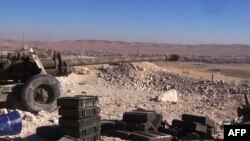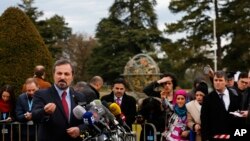GENEVA —
U.N. mediator Lakhdar Brahimi apologized to the Syrian people Saturday as the latest round of peace talks in Geneva between Syria's government and the opposition ended without agreement.
Brahimi's Saturday meetings with the two warring sides, which lasted only 27 minutes, was a last-ditch effort to rescue the deadlocked peace talks.
Brahimi said the Syrian people were expecting the talks to result in a way out of their "horrible crises." Instead, he said, "these two rounds of talks have not done very much."
The Syrian government’s refusal to accept a compromise proposed by the U.N. mediator has put the future negotiations talks in question.
Brahimi says the two delegations agreed on an agenda for the next round, but not on how they would deal with the complex issues. He says the agenda reflects topics each side considers most important. It is not immediately clear when a third round of talks will talk place.
For the Damascus government, Brahimi says "combating terrorism" — the term Damascus uses when discussing rebels — is the most important issue. The Western-backed opposition says formation of a transitional government is crucial to ending the civil war.
The opposition argues that Syrian President Bashar al-Assad cannot be a part of any transitional government, and that he has lost all legitimacy as a national leader. Negotiators representing the Syrian government reject this view.
Addressing media after Saturday talks, opposition spokesman Louay Safi blamed what he calls the government's "belligerence," while Syrian Deputy Foreign Minister Fayssal Mikdad said the opposition has an "unrealistic agenda."
In an effort to break the stalemate, the U.N. mediator told reporters he suggested the next round of talks should begin with a day of discussions about combating terrorism, followed by a day of discussions about a transitional government in Damascus.
“Unfortunately, the government has refused, which raises the suspicion of the opposition that in fact the government does not want to discuss the TGB [Transitional Governing Body] at all," Brahimi told reporters. "In that case, I have suggested that it is not good for the process, it is not good for Syria that we come back for another round.”
Brahimi says it makes no sense for the parties to return only to continue the same laborious discussions that lead nowhere. He says he told the delegations to go home, to reflect on what is at stake and to confer with their leaders on how to move ahead.
“I am very, very sorry and I apologize to the Syrian people that their hopes — which were very, very high that something will happen here," he said. "I think that the little that has been achieved in ... Homs gave them even more hope that maybe this is the beginning of the coming out of this horrible crisis they are in. I apologize to them, but on these two rounds [we] have not helped them very much.”
In the midst of this second round of talks, the United Nations succeeded in persuading the Syrian regime and rebels to abide by a ceasefire so food and medical aid could be brought to thousands of people in the besieged city of Homs.
In the meantime, the U.N. mediator will discuss the possible upcoming steps in the languishing peace process with Secretary-General Ban Ki-moon. Brahimi also said he also will try to arrange meetings with U.S. Secretary of State John Kerry and his Russian counterpart, Sergei Lavrov.
At some point, he said, he will discuss the crisis with the U.N. Security Council and the P-5 nuclear powers.
The U.N. Security Council on Friday continued discussions on a draft resolution that, among other things, expresses "grave alarm" over civilians trapped by Syrian forces.
U.S. President Barack Obama said late Friday a "diplomatic solution" must be found for Syria. The president said while he does not think a solution will be reached in the near future, steps will be taken to "apply more pressure to the Assad regime."
The president made the comments while meeting with Jordan's King Abdullah in California.
Russia is threatening a veto, calling it too one-sided against the Syrian government.
Aid distribution hampered
Chris Gunness, a spokesman for U.N. relief efforts in Syria, says the U.N. was again unable to distribute food and other aid items to the Yarmouk refugee camp in Damascus on Saturday. He said food distribution there has been stopped for more than a week, which is potentially life-threatening for the besieged civilians.
U.N. emergency relief coordinator Valerie Amos says getting aid to desperate civilians in Syria should not be a matter of controversy or politics.
The U.N. says the three-year civil war has killed more than 136,000 people and forced millions to flee their homes.
Brahimi's Saturday meetings with the two warring sides, which lasted only 27 minutes, was a last-ditch effort to rescue the deadlocked peace talks.
Brahimi said the Syrian people were expecting the talks to result in a way out of their "horrible crises." Instead, he said, "these two rounds of talks have not done very much."
The Syrian government’s refusal to accept a compromise proposed by the U.N. mediator has put the future negotiations talks in question.
Brahimi says the two delegations agreed on an agenda for the next round, but not on how they would deal with the complex issues. He says the agenda reflects topics each side considers most important. It is not immediately clear when a third round of talks will talk place.
For the Damascus government, Brahimi says "combating terrorism" — the term Damascus uses when discussing rebels — is the most important issue. The Western-backed opposition says formation of a transitional government is crucial to ending the civil war.
The opposition argues that Syrian President Bashar al-Assad cannot be a part of any transitional government, and that he has lost all legitimacy as a national leader. Negotiators representing the Syrian government reject this view.
Addressing media after Saturday talks, opposition spokesman Louay Safi blamed what he calls the government's "belligerence," while Syrian Deputy Foreign Minister Fayssal Mikdad said the opposition has an "unrealistic agenda."
In an effort to break the stalemate, the U.N. mediator told reporters he suggested the next round of talks should begin with a day of discussions about combating terrorism, followed by a day of discussions about a transitional government in Damascus.
“Unfortunately, the government has refused, which raises the suspicion of the opposition that in fact the government does not want to discuss the TGB [Transitional Governing Body] at all," Brahimi told reporters. "In that case, I have suggested that it is not good for the process, it is not good for Syria that we come back for another round.”
Brahimi says it makes no sense for the parties to return only to continue the same laborious discussions that lead nowhere. He says he told the delegations to go home, to reflect on what is at stake and to confer with their leaders on how to move ahead.
“I am very, very sorry and I apologize to the Syrian people that their hopes — which were very, very high that something will happen here," he said. "I think that the little that has been achieved in ... Homs gave them even more hope that maybe this is the beginning of the coming out of this horrible crisis they are in. I apologize to them, but on these two rounds [we] have not helped them very much.”
In the midst of this second round of talks, the United Nations succeeded in persuading the Syrian regime and rebels to abide by a ceasefire so food and medical aid could be brought to thousands of people in the besieged city of Homs.
In the meantime, the U.N. mediator will discuss the possible upcoming steps in the languishing peace process with Secretary-General Ban Ki-moon. Brahimi also said he also will try to arrange meetings with U.S. Secretary of State John Kerry and his Russian counterpart, Sergei Lavrov.
At some point, he said, he will discuss the crisis with the U.N. Security Council and the P-5 nuclear powers.
The U.N. Security Council on Friday continued discussions on a draft resolution that, among other things, expresses "grave alarm" over civilians trapped by Syrian forces.
U.S. President Barack Obama said late Friday a "diplomatic solution" must be found for Syria. The president said while he does not think a solution will be reached in the near future, steps will be taken to "apply more pressure to the Assad regime."
The president made the comments while meeting with Jordan's King Abdullah in California.
Russia is threatening a veto, calling it too one-sided against the Syrian government.
Aid distribution hampered
Chris Gunness, a spokesman for U.N. relief efforts in Syria, says the U.N. was again unable to distribute food and other aid items to the Yarmouk refugee camp in Damascus on Saturday. He said food distribution there has been stopped for more than a week, which is potentially life-threatening for the besieged civilians.
U.N. emergency relief coordinator Valerie Amos says getting aid to desperate civilians in Syria should not be a matter of controversy or politics.
The U.N. says the three-year civil war has killed more than 136,000 people and forced millions to flee their homes.





